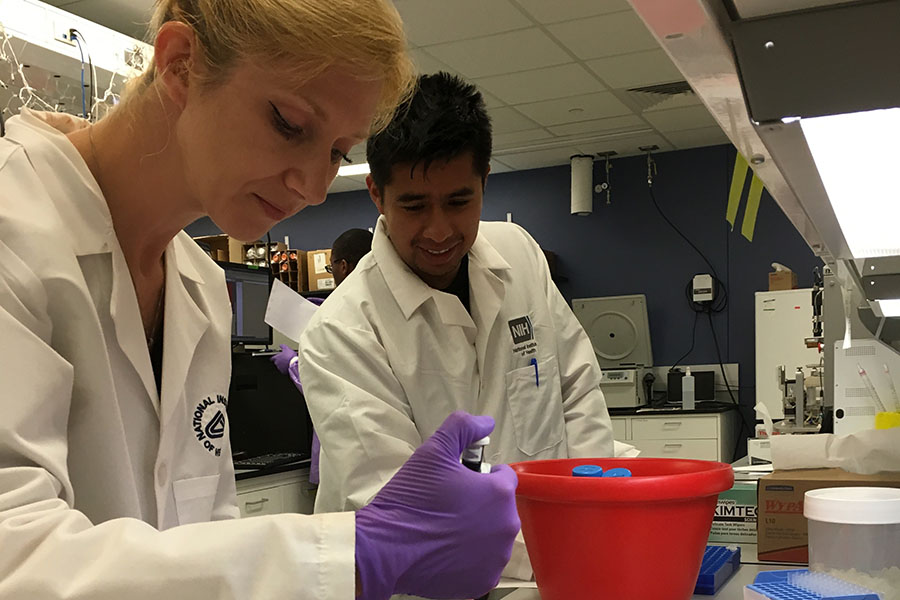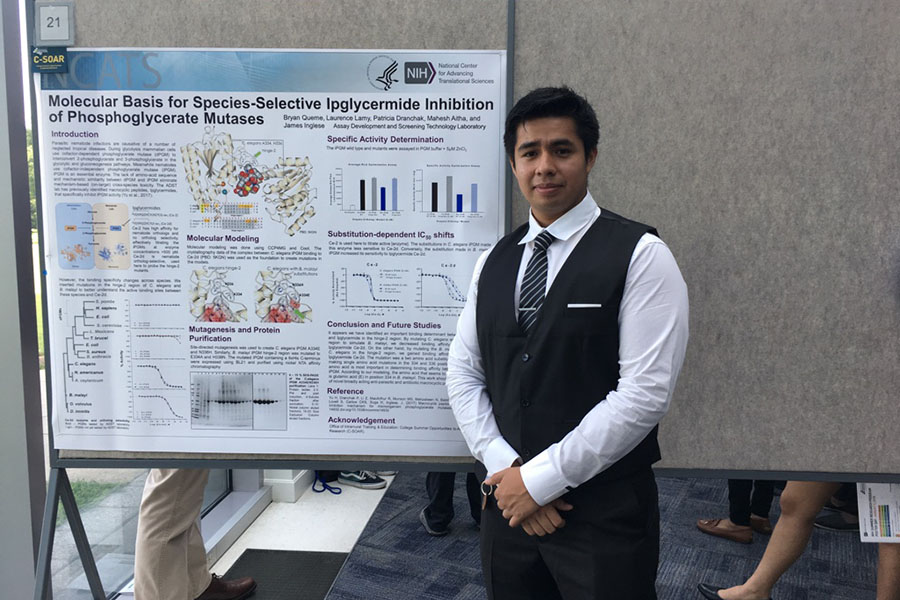Charting a New Path: NCATS Internship Helps Promising Student Soar
Translational Science Highlight
- NCATS mentors trainees through NIH-wide programs to help expand the pool of diverse translational scientists, including individuals from underrepresented groups and geographic areas. Training experiences at NCATS strengthen participants’ skills across research disciplines and help prepare trainees for successful scientific careers.
Bryan Queme was having a bad day. The 23-year-old senior biochemistry major at Biola University in southern California had received emails from several institutions informing him that his summer internship applications had been rejected.
He was disappointed, but undaunted, and began researching other opportunities. That’s when the note from NIH arrived.
“I saw the email and figured that NIH had rejected me too,” Queme said. “But then I read it — and read it again. I was speechless: NIH was interested in me! I was in shock and very happy.”
The email informed Queme that he had been accepted into the NIH College Summer Opportunities to Advance Research (C-SOAR) program in the Office of Intramural Training & Education. He would be matched with NCATS’ Assay Development and Screening Technology (ADST) laboratory under the mentorship of lab director James Inglese, Ph.D.
Cracking the Scientific Code

Patricia K. Dranchak, Ph.D., shows a lab technique to 2018 summer intern Bryan Queme.
Launched in early 2018, NIH’s C-SOAR program is designed to engage a diverse group of individuals who are considering careers in the biomedical sciences. Specifically, C-SOAR seeks students who have not yet had the opportunity to participate in a research-intensive summer program, who lack opportunities to conduct research during the academic year, or who cannot explore their interests in biomedical research at their academic institutions.
Erika L. Barr, Ph.D., is the director of the C-SOAR program. She said that Queme is precisely the type of scientist that C-SOAR is looking to attract.
“Bryan’s an example of the importance of all students having access to opportunities,” Barr said. “He is a student who’s very focused, he’s passionate, and he’s smart and driven. He’s a high achiever.”
“From the get-go, Bryan was deeply curious about science,” Inglese said. “He immediately started digging into the issues and problems that we were studying in the ADST lab. He was very tenacious to absorb as much as he could about the problems and help us find solutions.”
Drawing on his strong biochemistry background and proficiency in computer science and coding, Queme designed and introduced new molecular modeling protocols to aid the NCATS lab’s scientists in understanding a new potential drug class mechanism being developed for a neglected tropical disease.
“Bryan quickly saw that molecular modeling would be helpful,” Inglese explained. “He researched and downloaded the software on his own and figured out how to use it to solve the problem we were working on. He had an immediate impact on our project with his computational skills.”
Reaching for the Top
Queme’s journey to the NCATS lab in Rockville, Maryland, began in South Central Los Angeles, where he grew up in a single-parent household.
“My mom emigrated from Guatemala when she was 20 years old and ended up in L.A.,” Queme said. “She strongly encouraged me to get good grades and go to college, but the academics at my high school weren’t really that good.”
Queme’s life was forever changed in 2013 when he applied for and received a grant from the Gates Millennium Scholars (GMS) program. Funded by a grant from the Bill & Melinda Gates Foundation, GMS was established in 1999 to provide outstanding African American, American Indian/Alaska Native, Asian/Pacific Islander American and Hispanic American students with an opportunity to complete an undergraduate college education in any discipline. The grant was the only way that Queme could afford to go to college.
Queme was accepted into the biochemistry program at the University of California, Los Angeles (UCLA), but his first year there presented two challenges.
“I realized that UCLA wasn’t right for me,” he said. “And during that year, my mom was diagnosed with diabetes. Seeing how the doctors took care of my mother inspired me to want to help others, and so I went the pre-med route.”
Queme transferred to Biola University, a small private school in nearby Orange County, where he thrived. In May 2018, Queme became the first member of his family to graduate from college. He also realized the many challenges faced by physicians in providing quality care to patients.
“I thought, ‘How else can I make an impact?’ And that’s when I decided that I wanted to go into research,” he said. “I really hope that I can inspire other lower-income people and people of color to study science.”
“Bryan’s experiences shaped and molded him and helped guide him on a career path,” Barr said. “He’s hungry for education, for accomplishing career goals, exploring and taking advantage of opportunities. I really respect that passion in him. He’s going to do great things.”

Bryan Queme in front of a poster display that describes his summer research project with NCATS.
Joining the NCATS Team
Almost immediately after graduation, Queme landed on the East Coast for the first time to begin his NCATS internship. He acclimated quickly, both to the steamy summer weather of the Washington, D.C., area and to the NCATS lab, where he soon became an important member of the ADST team.
“C-SOAR is an 8- to 10-week program. We know our interns will learn how to conduct rigorous science, but it is never clear how much of a contribution someone will be able to make in such a short period of time,” said Jessica M. Faupel-Badger, Ph.D., director of training and education in NCATS’ Division of Preclinical Innovation. “Bryan made a significant contribution. Everyone was delighted to have Bryan as part of the group. Everyone wanted to keep him longer.”
At the conclusion of his internship, Queme headed straight to Boston to pursue a master’s degree in computer science. However, his desire for more research experience has led him back to NCATS for now. Beginning in January 2019, he will spend roughly a year working with Inglese’s team through the NIH Postbaccalaureate Intramural Research Training Award program. The opportunity will enable Queme to get further practical experience in a laboratory and continue the work in molecular modeling that he is passionate about. At the same time, he is applying to doctoral programs.
“I really want to focus on computational science and on drug discovery and development,” he said. “At NCATS, I got to see real translational problems being tackled by intelligent people and saw how they approached them, how they tackled them.”
Posted December 2018


